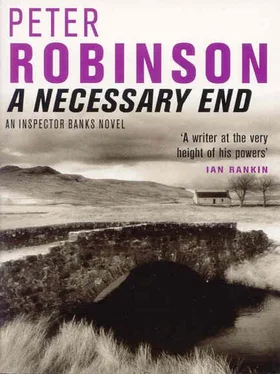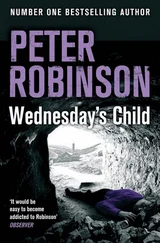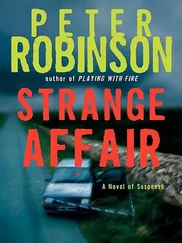Peter Robinson - A Necessary End
Здесь есть возможность читать онлайн «Peter Robinson - A Necessary End» весь текст электронной книги совершенно бесплатно (целиком полную версию без сокращений). В некоторых случаях можно слушать аудио, скачать через торрент в формате fb2 и присутствует краткое содержание. Год выпуска: 1989, ISBN: 1989, Издательство: Avon, Жанр: Полицейский детектив, на английском языке. Описание произведения, (предисловие) а так же отзывы посетителей доступны на портале библиотеки ЛибКат.
- Название:A Necessary End
- Автор:
- Издательство:Avon
- Жанр:
- Год:1989
- ISBN:9780330514729
- Рейтинг книги:5 / 5. Голосов: 1
-
Избранное:Добавить в избранное
- Отзывы:
-
Ваша оценка:
- 100
- 1
- 2
- 3
- 4
- 5
A Necessary End: краткое содержание, описание и аннотация
Предлагаем к чтению аннотацию, описание, краткое содержание или предисловие (зависит от того, что написал сам автор книги «A Necessary End»). Если вы не нашли необходимую информацию о книге — напишите в комментариях, мы постараемся отыскать её.
A Necessary End — читать онлайн бесплатно полную книгу (весь текст) целиком
Ниже представлен текст книги, разбитый по страницам. Система сохранения места последней прочитанной страницы, позволяет с удобством читать онлайн бесплатно книгу «A Necessary End», без необходимости каждый раз заново искать на чём Вы остановились. Поставьте закладку, и сможете в любой момент перейти на страницу, на которой закончили чтение.
Интервал:
Закладка:
II
Burgess winked at Glenys, who smiled and blushed. Banks was the only one to notice Cyril's expression darken. They carried their drinks and ploughman's lunches back to the table.
"How's Boyd?" Burgess asked.
"He's all right. I didn't know you cared."
Burgess spat the remains of a pickled onion into his napkin: "Bloody awful stuff. Gives me heartburn."
"I wouldn't be surprised if you're developing an ulcer," Banks said, "the way you go at life."
Burgess grinned. "You only live once."
"Are you going to stick around and see what happens?"
"I'll stay a few more days, yes." He eyed Glenys again. "I'm not quite finished up here yet."
"Don't tell me you're getting to like the north?"
"At least the bloody weather's improved, even if the people haven't."
"Friendliest lot in the country, when you get to know them."
"Tell me about it." Burgess shoved in a chunk of Wensleydale and washed it down with Double Diamond.
Banks grimaced. "No wonder you get heartburn."
Burgess pushed his plate aside and lit a cigar. "Tell me honestly, Banks. What do you make of Boyd? Guilty or not?"
"He's obviously involved. Deeply involved. But if you're asking do I think he killed Gill, the answer's no, I don't."
"You could be right. He certainly stuck to his guns under pressure, and I don't think he's that tough." Burgess prodded the air with his cigar. "Personally, I don't give a damn what happens to Boyd. I'd rather see him go down for it than no one at all. But give me some credit. I'm not a bloody idiot, and if I'm not satisfied everything's wrapped up I like to know why. I get nagging feelings like every copper."
"And you have one about Boyd?"
"A little one."
"So what are you going to do?"
"Consider the alternatives. You heard what he said last night, about the others going up to the farm on Friday afternoon. That covers just about everyone we've had our eye on since this business started. Who do you reckon?"
Banks sipped some beer to wash down his lunch. "It depends," he said. "Any of the people Boyd mentioned could have got access to the knife, and so could anyone else who went up there a few days before the demo. Nobody had noticed whether it was missing or not — at least, nobody admits to noticing. If you're convinced it was a terrorist act, then obviously you're best starting with the most politically active of them: Osmond, Trelawney and the students. On the other hand, if you accept that there could have been some other motive, then you have to rethink the whole thing in more human terms: revenge, hatred, that kind of thing. Or maybe someone was trying to put the blame on the farm people, someone who had a reason to hate them or want them off their land."
Burgess sighed. "You make it sound so bloody complicated. Do you really think that's where the answer lies?"
"It's possible, yes." Banks took a deep breath. "Gill was a bastard," he said.
"He liked thumping people, bashing heads. He's volunteered for more crowd control duties than I've had hot dinners. And another thing: Osmond made an official complaint about him for using undue force in another demo a couple of years back. So did a woman called Elizabeth Dale, in a separate incident. And she's got some connection with the farm crowd."
Burgess drank some more beer and sucked his lips. "How do you know?" he asked quietly.
Banks had been expecting this. He remembered Burgess's order not to look into Gill's record. "Anonymous tip," he said.
Burgess narrowed his eyes and stared as Banks took out a cigarette and lit it."I don't know if I believe you," he said finally.
"It doesn't bloody matter, does it? It's what I'm telling you that counts. Do you want to get to the bottom of this or don't you?"
"Go on."
"I'm saying we've got two options: terrorism or personal motive. Maybe they're both mixed up as well, I don't know."
"And where does Boyd come in?"
"Either he did exactly as he told us, or he was an accomplice. So we dig deeper into his political background. Richmond's doing all he can at the computer, checking people Boyd knew in jail and any others he hung about with when the local police were keeping an eye on him. He spent some time in Ireland, which is where he was heading when we caught him, and some of the people he knew had connections with the IRA. We can't prove it, but we're pretty damn sure. We also have to consider the personal motive. Gill was the kind of person to make enemies, and it looks like Osmond was one of them."
"In the meantime," Burgess said, "we hang on to Boyd."
Banks shook his head. "I don't think so."
"Let him go?"
"Yes. Why not?"
"He scarpered last time. What's to stop him doing it again?"
"I think he found out that he'd nowhere to go. If you let him out, he'll go back to the farm and stay there."
"But why let him out at all?"
"Because it might stir something up. If he's not guilty, there's still a chance he might know who is. He might slip up, set something moving."
Burgess swirled the beer in his glass. "So we charge him with tampering with evidence, wasting police time, and let him out. Is that what you're suggesting?"
"For the time being, yes. Have you got a better idea?"
"I'm not convinced," Burgess said slowly, "but I'll go along with it. And," he added, poking his cigar in Banks's direction, "on your head be it, mate. If he buggers off again, you'll answer for it."
"All right."
"And we'll keep him in another night, just so he gets the message. I'll have another little chat with him, too."
It was a compromise. Burgess was not the kind of man to give way completely to someone else's idea. It was the best deal he would get, so Banks agreed.
Burgess smiled over at Glenys. Down at the far end of the bar, a glass broke.
"I'll go get us a couple more, shall I?"
"Let me." Banks stood up quickly. "It's my round." It wasn't, but the last thing they needed was a lunchtime punch-up between the landlord of the Queen's Arms and a detective superintendent from Scotland Yard.
"I'll take Osmond again, too," Burgess said, when Banks got back. "I don't trust you when that bird of his is around. You go all gooey-eyed."
Banks ignored him.
"Can I take DC Richmond with me?" Burgess asked.
"What's wrong with Sergeant Hatchley?"
"He's a lazy sod," Burgess said. "How he ever made sergeant I don't bloody know. Every time he's been with me he's just sat there like a stuffed elephant."
"He has his good points," Banks said, surprised to find himself defending Hatchley. He wondered if the sergeant really had been nurturing a dream of Burgess's inviting him to join some elite Yard squad just because they both believed in the privatization of everything and in an England positively bristling with nuclear missiles. If he had, tough titty. The difference between them, Banks thought, was that Hatchley just assumed attitudes or inherited them from his parents; he never thought them out. Burgess, on the other hand, really believed that the police existed to hold back the red tide and keep immigrants in their place so that the government could get on with the job of putting the Great back in Britain. He also believed that people like Paul Boyd should be kept off the streets so that decent citizens could rest easy in their beds at night. It never occurred to him for a moment that he might not pass for decent himself.
Banks followed Burgess back to the station and went up to his office. He had a phone call to make.
12
I
South of Skipton, the landscape changes dramatically. The limestone dales give way to millstone grit country, rough moorland for the most part, bleaker and wilder than anything in Swainsdale. Even the dry-stone walls are made of the dark purplish gritstone. The landscape is like the people it breeds: stubborn, guarded, long of memory.
Читать дальшеИнтервал:
Закладка:
Похожие книги на «A Necessary End»
Представляем Вашему вниманию похожие книги на «A Necessary End» списком для выбора. Мы отобрали схожую по названию и смыслу литературу в надежде предоставить читателям больше вариантов отыскать новые, интересные, ещё непрочитанные произведения.
Обсуждение, отзывы о книге «A Necessary End» и просто собственные мнения читателей. Оставьте ваши комментарии, напишите, что Вы думаете о произведении, его смысле или главных героях. Укажите что конкретно понравилось, а что нет, и почему Вы так считаете.












